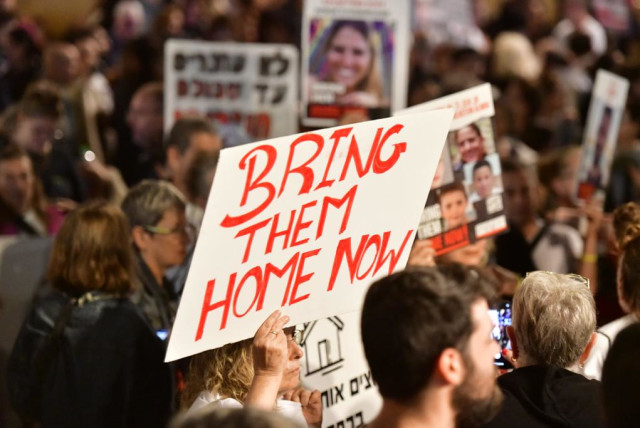US must pressure Qatar for hostage deal - opinion

So far, the IDF pressure has neither fully subdued Hamas nor reached another hostage deal.
The October 7 massacre delivered a harsh blow to Qatar’s carefully cultivated image, revealing it as Hamas’s biggest donor, Doha, which has spent more than a decade trying to bill itself as the ultimate mediator of the Middle East, and not one to miss an opportunity to polish its image, became the most significant player in the hostage deal.
However, with 136 Israelis still in captivity, Washington must put more pressure on Doha and take advantage of its sensitivity to international criticism – in order to ensure the immediate release of the hostages.
Qatar served as a key player in the first hostage deal but since then, no progress has been made. Although there are other reasons for the impasse between Israel and Hamas, it cannot be ignored that Qatar is not using its full power to pressure Hamas.
The reasons for this are simple. The praise that Qatar garnered for the successful mediation and the subsequent lack of any significant international pressure to accept responsibility (in funding Hamas) for the release of the captives, Doha now feels that its image has been restored, so it has no interest in investing efforts in another deal.
Washington must use everything at its disposal to pressure Doha to reach a deal, especially after past experience proves that international pressure does manage to influence Qatar’s policy.
Recently, President Joe Biden’s pressure on Qatar’s emir resolved the crisis in the negotiations; and several years ago, international pressure led Qatar to cancel the abusive employment laws of its foreign workers.
In addition, Doha’s economic strength, its interest in the West, and its huge investments in Europe have made the country very sensitive to its public perception, especially after the Arab boycott in response to its support for terrorism.
Washington must be assertive with Qatar
Therefore, Washington is required to adopt a more assertive approach and prove to Doha that it has a lot to lose and that it cannot hold the stick at both ends as it has done so far.
On the one hand: funding terrorism, continuing to host Hamas leaders, and operating Al-Jazeera, which serves as a conduit for Hamas to convey messages; and on the other hand maintaining extensive ties with key Western countries.
Moreover, the administration is required to clarify to the Qataris that their inability to deliver on their commitments regarding the return of all remaining hostages will significantly impact bilateral relations and entail economic steps that will seriously damage Qatar’s image.
It can be assumed that this will have a domino effect. Significant American pressure on Qatar, which will lead to pressure on Hamas, can only come from Jerusalem putting pressure on Washington.
Israel should leverage the American longing for the end of the war and emphasize to the US that the release of the hostages is an integral part of the battle. Therefore, promoting another deal is a pure American interest.
This is a complex balance that cannot be ignored. The US must handle the issue wisely since Qatar is a strategic ally that serves American interests for many reasons. Doha has become an important tool for making American deals with Iran; it hosts the central headquarters of the US military in the Gulf, stands on the American side in the competition against China, and assisted the American withdrawal from Afghanistan.
However, the balance of power between the countries, Qatar’s security dependence on the US, and the leverage of American pressure as the strongest power in the world leads to the conclusion that the US can further push Qatar into the corner, without harming the strategic relations between the countries.
So far, the IDF pressure has neither fully subdued Hamas nor reached another hostage deal. Therefore, Qatari leverage on Hamas via threats to their relations and expelling their leaders from the country takes on greater significance. Such a move, which promotes American and Israeli interests, could only be carried out through massive pressure from Washington, and the exploitation of Qatar’s sensitivity to its international image.
The writer has nearly a decade of experience as an intelligence analyst in the Israeli defense establishment. Currently in his fourth and final year of pursuing a degree in law (LLB) & government (BA) at Reichman University, he is a fellow of the Argov Fellowship in Leadership and Diplomacy.
Jerusalem Post Store
`; document.getElementById("linkPremium").innerHTML = cont; var divWithLink = document.getElementById("premium-link"); if (divWithLink !== null && divWithLink !== 'undefined') { divWithLink.style.border = "solid 1px #cb0f3e"; divWithLink.style.textAlign = "center"; divWithLink.style.marginBottom = "15px"; divWithLink.style.marginTop = "15px"; divWithLink.style.width = "100%"; divWithLink.style.backgroundColor = "#122952"; divWithLink.style.color = "#ffffff"; divWithLink.style.lineHeight = "1.5"; } } (function (v, i) { });

